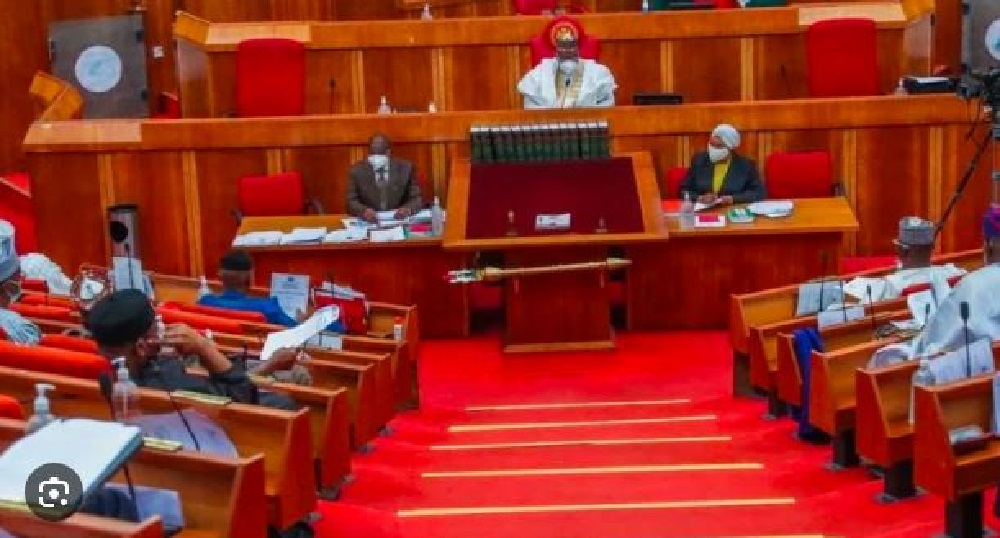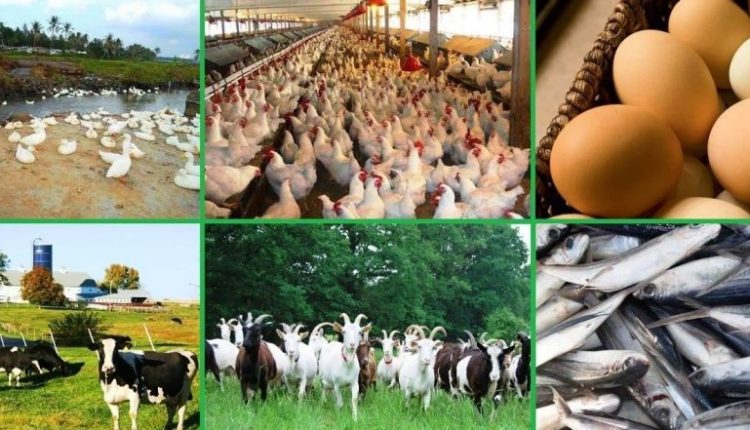News
Nigerians are hungry, losing patience with your Govt — Senate tells President Tinubu

The Senate has urgently called upon the federal government to tackle the pressing issue of hunger caused by food insecurity, which it has identified as an emergency situation.
In response to rising food insecurity, the Senate has urged President Bola Tinubu’s administration to implement effective measures to combat the crisis. It emphasized that with increasing hunger and poverty, people’s patience and tolerance are wearing thin.
Furthermore, the Senate cautioned against an impending crisis, warning that the country cannot afford the unrest that could erupt in its streets. It stressed the need for immediate action by the Executive arm of government to address the grievances of the people and avoid taking their support for granted.
Over recent months, the Senate observed a significant increase in the prices of goods and household essentials across Nigeria. This surge has led to heightened inflation rates, diminished purchasing power, and a deterioration in the living conditions of the majority of Nigerians.
As an urgent response to the food scarcity problem, the Senate disclosed that the Federal Government has dispatched 60 trucks of fertilizer to each of the 36 states, allocating two trucks per Senator and one per member of the House of Representatives.
These Senate resolutions followed a motion titled “Urgent Need to Address Food Insecurity and Market Exploitation of Consumables in Nigeria,” sponsored by Senator Sunday Karimi of Kogi West, APC, and co-sponsored by Senate Whip Senator Ali Ndume of Borno South, APC.
Senator Karimi highlighted the recent steep rise in the prices of goods and household essentials, which has exacerbated inflation and worsened living conditions for many Nigerians.
According to him, ” the latest data by Nigeria’s National Bureau of Statistics shows that food inflation in the country skyrocketed to 40.66 per cent on a year-on-year basis, a significant increase from the 24.82 per cent recorded in May 2023.”
He said that the Senate is “Aware the current market price of food items such as beans, maize, rice paddy, yam, tomatoes, and onions which initially rose by about 40% after the removal of petroleum Subsidy has now increased to over 100% to 300% without any attributable reason for the increase in prices;
He added that the Senate is “Further aware that although insecurity in food-producing regions, bad roads, increase in the cost of transportation attributable to the removal of fuel subsidy and depreciation of the value of Naira, are possible factors that have contributed to the increase in the price of Food items, Household Commodities, and Consumables; the percentage of increase in the cost of transportation and some under factors listed above is significantly less than the percentage increase in the current prices of goods all over the country;
“Concerned that the greater percentage of the increase in prices of food items and consumables in the Country is not only due to these factors but to the zest of the merchants, traders, and retailers to make supernormal profits whilst they excuse the hike in price on these factors (depreciation of the Naira against the Dollar, increase in price of Petroleum Products due to Fuel price increase and insecurity in farming Regions), thereby heaping all the blame on the Federal Government;
“Notes that there is a general attitude of “Get Rich Quickly” or “Get Rich By All Means” leading many Nigerians to jettison “being their brother’s keeper” and exploiting one another to make abnormal profits: This attitude has been justified on the basis that many members of the Political Class, Technocrats, and Corporate Elites have helped themselves with Public Funds without any repercussions in Law, Nigerian Traders have thus resorted to Price Gouging to maximize profits;
“Further notes that there are reports that Farming Communities in the Border Regions with other Countries, prefer to sell their food items abroad (to these neighbouring countries), rather than domestically(to the hinterland), thereby increasing local food insecurity; and Concludes that all efforts made by the current Federal Executive to arrest the consistent increase in food inflation have not yielded the desired results, there is a need to be more pragmatic about addressing food insecurity, curbing herder farmer crises, kidnapping for ransom, and Terrorism, and ensure the development of a viable National Commodity Board to regulate the price of grains and ensure the elimination of artificial contributions to food and commodity inflation in Nigeria.”
In his contribution, Ndume who lamented that this was the first time Nigeria was listed as one of the countries battling food insecurity, said, “In their many publications, they say Nigeria is likely to experience the highest session of food insecurity globally.
“Currently, there are four countries including Sudan and some others that are facing very serious insecurity. Nigeria is added to this list this year by the International Rescue Committee as one of the spots for food insecurity action against hunger. World Food Program also indicated that over 32 million people are expected to face a critical hunger crisis and emerging levels between June and August.
“I don’t know about some other colleagues, but there in the North, we have started seeing it visibly. This is the first time we are experiencing this level of hunger. It’s the first time Nigeria is being listed as one of the countries with food insecurity.”
On his part, the immediate past President of the Senate, Senator Ahmad Lawan, APC, Yobe North told his colleagues that the people are really hungry in the country, warning that patience and tolerance are both elastic, but they are not eternally elastic, just as he took a swipe at the Federal Government, saying that the government has nothing in the food Reserve across the Country and that the Silos are empty.
Lawan said, “Let me say here that patience, and tolerance, are both elastic but they are not eternally elastic. Our students are facing real, real anger. I travelled the two states last week, in the north particularly, and I’ve seen first-hand how people, especially those who are not in the civil service, nor in any business, are suffering, fighting, and struggling to have food at least once a day.
“Under normal circumstances, Mr. President, in the rainy season, from maybe June up to September or October, when there will be harvests of new foodstuff, prices escalate prices of foodstuff. Now we don’t even have that the truth. Mr. President in today’s national daily, the Executive arm of government is saying it is considering reducing or removing taxes on imported foodstuff.
” Here’s the catch. This Senate must engage the executive immediately. What are the issues? Which taxes are they talking about? Because we should be seen to be doing the right thing. We have little or nothing in our food reserve across the country. And nobody. If they come and tell us, they will distribute foodstuff from our silos, the silos are empty. So it means we have to import food. And if we have to import, it means we need foreign exchange.
“We wouldn’t like the kind of thing that we see in our streets and it is time that we take every possible action to get out of the event of the arm of government to ensure that food floods our country, the right food. In portation, the government must be entirely responsible because we cannot, we cannot take people for granted for too long. We have come almost to the end of the patience. And I think the elasticity is now going to snap if we are not careful.”
News
Nigeria’s Livestock Sector Will Generate N33trn Revenue If Properly Harnessed – Minister Maiha

Naijablitznews.com recalled that upon assumption of office, the Minister pledged to reform Nigeria’s livestock industry to enhance food security, create a safe environment for all stakeholders, and attract foreign investment.
He disclosed a vision for the newly established ministry to include comprehensive reforms aimed at “unbundling” the sector, strengthening infrastructure, and meeting Nigeria’s growing demand for animal protein.
News
Gov Eno presents N955bn budget to Akwa Ibom Assembly

Akwa Ibom State governor, Pastor Umo Eno, presented a proposed total budget outlay of N955 billion for the 2025 fiscal year to the State House of Assembly for consideration on Tuesday.
This was against the revised provision of N923.46 billion in the 2024 budget.
The 2025 financial appropriation estimate comprised recurrent expenditures of N300 billion and capital expenditures of N655 billion.
Eno said that the total capital receipts and expenditure for the year 2025 is estimated at N655 billion as against the proposed revised provision of N573.32 billion for 2024.
He said that the 2025 Budget, which is christened “Budget for Consolidation and Expansion,” is predicated on an oil benchmark of $75 per barrel at a production rate of 2.12 million barrels per day with an estimated exchange rate of N1,400/US$.
The Governor added that the 2025 oil benchmark and exchange rate is in line with the National Budget benchmark projections.
He said that the total projected recurrent revenue for 2025 is estimated at ₦830 billion as against the proposed revised provision of B803.70 billion, representing a 3 per cent increase in revenue projection for the year 2025.
The governor said the policy thrust objectives of the 2025 budget would be to achieve food security through investing heavily in the agricultural revolution.
Other objectives included rural development through robust investments in modern living facilities such as all seasonal roads, rural electrification and others within rural communities to ultimately improve the quality of life for those in the rural areas and help stem rural-urban migration. Ensuring that public schools in the state are equipped and staffed by teachers who are passionate and dedicated.
He said to realise the year 2025 budget objectives, the state shall adopt and improve the effectiveness of budget performance by ensuring fiscal discipline through the implementation of only programmes that were captured in the budget, among other strategies.
In his remarks, Speaker of the Assembly, Udeme Otong, assured the governor that the lawmakers would quicken the consideration process to ensure speedy passage of the 2025 budget estimate to fasten development in the state.
Otong urged all heads of Ministries, Departments, and Agencies (MDAs) in the state to cooperate with the House of Assembly during the budget defence to ensure speedy passage of the budget.
News
Nigeria loses $1.1bn to malaria yearly – Minister

The Coordinating Minister of Health and Social Welfare, Prof Muhammad Pate said the annual loss to Nigeria’s Gross Domestic Product from malaria exceeds $1.1bn.
Prof Pate said this in Abuja at the inaugural meeting of the Advisory Body on Malaria Elimination in Nigeria.
A statement by the Deputy Director of Information & Public Relations at the ministry, Alaba Balogun, on Tuesday, stated that Pate described malaria as not just a health crisis, but an economic and developmental emergency that must be eliminated.
Pate said the launch of the advisory body was a bold and decisive step to confront and address the disease.
He said, “Malaria continues to exert an unacceptable toll on Nigeria. With 27 per cent of global malaria cases and 31 per cent of global malaria deaths, our country bears the heaviest burden of this disease. In 2022, over 180,000 Nigerian children under the age of five lost their lives to malaria – a tragedy we have the tools to prevent.
“This is not just a health crisis; it is an economic and developmental emergency. Malaria reduces productivity, increases out-of-pocket health expenditures and, compounds the challenges of poverty. The annual loss to Nigeria’s GDP from malaria exceeds $1.1bn, a stark reminder of the economic imperative of elimination.”
The minister said malaria elimination was a critical component of the Nigeria Health Sector Renewal Investment Initiative framework for transforming the health sector, in alignment with the Renewed Hope Agenda of the present administration.
He also highlighted the importance of traditional and religious leaders to drive grassroots support and influence behavioural change.
The Minister of State for Health and Social Welfare, Dr Iziaq Salako, affirmed the advisory body as a group of experts who will provide evidence based advisory to help the country to reduce its unacceptable malaria burden, and set up realistic paths to a malaria-free Nigeria.
“For us to succeed, the private sector, the international partners, the healthcare workers and, the communities we serve must be harnessed and coordinated,” Salako added.
The advisory body is made up of globally renowned experts under the leadership of Prof Rose Leke.
The experts are charged with refocusing on advancing evidence-based solutions that address current challenges, ensuring that malaria elimination is prioritised in the budgets and plans of all levels of government and, creating frameworks for accountability that ensure sustained progress.
-

 News22 hours ago
News22 hours agoBREAKING: Makarfi dies in Kaduna at 93
-

 News19 hours ago
News19 hours agoSimon Ekpa reportedly released from Finnish police detention
-

 Metro15 hours ago
Metro15 hours agoWoman, baby die in Ondo church during delivery, police arrest prophetess
-

 Metro2 hours ago
Metro2 hours agoSAD! Gas explosion rocks Lagos market, 11 shops damaged
-

 Metro19 hours ago
Metro19 hours agoPolice arrest drug dealer, robber in Bauchi
-

 Metro3 hours ago
Metro3 hours agoMany admitted after reacting to drugs shared during free medical outreach
-

 Metro19 hours ago
Metro19 hours agoLibya arrests four Nigerians over drug trafficking, health risks
-

 News19 hours ago
News19 hours agoPort Harcourt Refinery: Lifting of petroleum products begins as NNPCL starts operations








